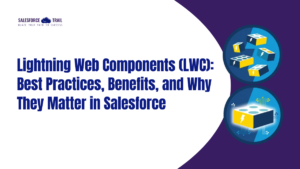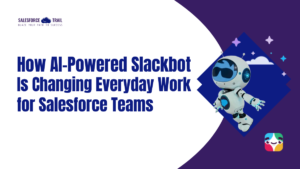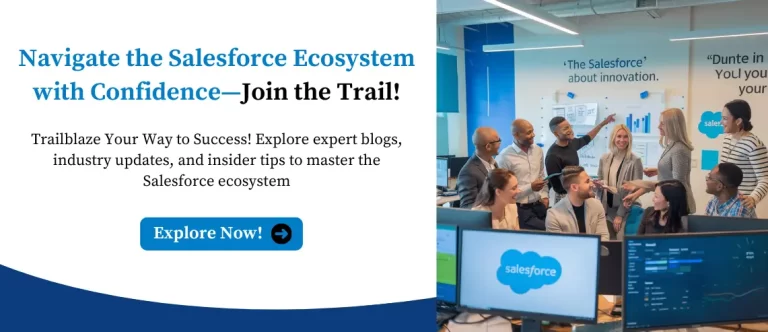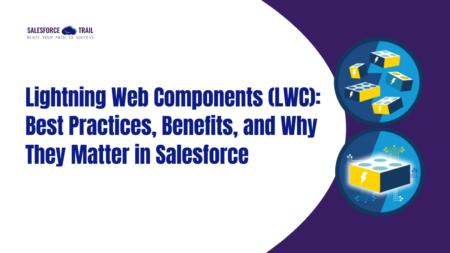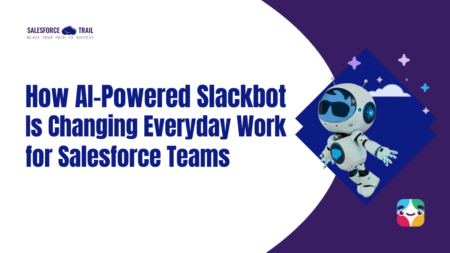Salesforce AI Agents are transforming the way businesses engage with customers, streamline workflows, drive growth, and more. These intelligent assistants, powered by Salesforce’s robust AI framework, can automate repetitive tasks, handle customer inquiries, and even provide personalized recommendations. But to unlock their full potential, businesses must train and customize them effectively. Let’s explore how to get started.
What are Salesforce AI Agents?
Salesforce AI Agents are advanced digital assistants built on the Salesforce Einstein platform. They leverage natural language processing, machine learning, and real-time CRM data to automate tasks, personalize customer interactions, and boost efficiency across Salesforce applications. Fully integrated, customizable, and scalable, these AI Agents deliver omnichannel support, making them essential for businesses seeking smarter customer engagement and streamlined operations.
Step 1: Define Your Business Objectives
Start by identifying the specific tasks and challenges you want your AI Agent to handle. Do you want to improve case resolution times, personalize customer experiences, or automate data entry? Clearly defining your goals helps you design the right training strategy.
Tip: Engage your service, sales, and IT teams early to gather feedback on potential use cases.
Step 2: Collect and Prepare Quality Data
High-quality data is the foundation of any successful AI training process. Salesforce AI Agents learn from the data you provide, whether it’s past customer interactions, emails, chats, or knowledge base articles. Make sure your data is:
- Accurate: Correct any errors or outdated information.
- Relevant: Utilize data that aligns with the tasks your AI Agent will perform.
- Clean: Remove duplicates and irrelevant information.
Salesforce provides tools like Data Cloud and Data Loader to help you prepare and manage your data.
Step 3: Train Your Salesforce AI Agent
Once your data is ready, it’s time to train your AI Agent. Salesforce makes this process intuitive with its user-friendly interface. Here’s how you can do it:
- Select the Right Model: Salesforce Einstein offers pre-built models for common use cases (like case classification or lead scoring). You can create custom models using Einstein Bots or Einstein Prediction Builder.
- Feed Your Data: Upload your prepared datasets into the chosen model.
- Test and Validate: Run test scenarios to ensure the AI Agent understands the tasks and responds correctly. Adjust parameters or refine training data as needed.
Step 4: Customize for Your Business
No two businesses are alike, and neither should your AI Agent be. Salesforce allows you to customize your agent to reflect your brand’s voice and align with your processes:
- Tone and Language: Adjust the tone of the AI Agent’s responses to match your company’s style, whether formal, friendly, or technical.
- Workflows: Integrate the agent into your existing Salesforce workflows. For example, you can connect it with Service Cloud to escalate complex cases or with Marketing Cloud to handle campaign inquiries.
- User Permissions: Control who can manage and modify the AI Agent to ensure data security and governance.
Step 5: Monitor and Improve
Training your Salesforce AI Agent is not a one-time task. Continuous monitoring and improvement are key to long-term success. Use Salesforce’s built-in analytics tools to:
- Track performance metrics like resolution time, customer satisfaction, and deflection rates.
- Identify areas where the agent struggles (e.g., misunderstood queries or low confidence scores).
- Refine training data and update the model regularly to keep it aligned with evolving business needs
Best Practices for Success
To make the most of Salesforce AI Agents, start with high-impact use cases that drive quick wins. Engage cross-functional teams to define objectives and ensure the AI reflects your business needs. Focus on high-quality, well-governed data to train your AI effectively. Ensure a balance between automation and human supervision by establishing clear escalation routes. Continuously monitor AI performance using Salesforce analytics and ensure compliance with data privacy regulations. Finally, invest in continuous learning to keep your team up-to-date with Salesforce’s latest AI capabilities. Following these best practices sets the stage for AI Agents to enhance efficiency and build strong customer relationships.
Final Thoughts
Customizing and training Salesforce AI Agents is not just about technology—it’s about transforming how your business operates. By aligning these agents with your distinct workflows and data, you unlock efficiency, enhance customer experiences, and gain a competitive advantage. Salesforce AI Agents are here to empower your teams—ensure you fully leverage their potential.
Must-Visit Links:
- Salesforce Certifications Name Changes 2025: A Complete Guide for Salesforce Professionals
- Dreamforce 2025 Registration is Open Now: Everything You Need to Know
- How to Crack the Salesforce Interview: Real Questions and Tips from Experts
- Top Most In-Demand Salesforce Skills for 2025: What Professionals Need to Know
- How I Passed the Salesforce Data Architect Exam on My First Attempt
- How to Prepare for the Certified Agentforce Specialist Certification Exam
Resources
- [Salesforce Developer]- (Join Now)
- [Salesforce Success Community] (https://success.salesforce.com/)
For more insights, trends, and news related to Salesforce, stay tuned with Salesforce Trail
Mark Jacobes is a seasoned Salesforce expert, passionate about empowering businesses through innovative CRM solutions. With over 6 years of experience in the Salesforce ecosystem, Mark specializes in Salesforce development, integrations, and digital transformation strategies.
- Mark Jacobeshttps://salesforcetrail.com/author/markjacobes/September 8, 2025
- Mark Jacobeshttps://salesforcetrail.com/author/markjacobes/
- Mark Jacobeshttps://salesforcetrail.com/author/markjacobes/
- Mark Jacobeshttps://salesforcetrail.com/author/markjacobes/
